Teaching sustainability

Adam Morton talks to Eco-Schools Manager, Carmel Fyfe about the project and the benefits of teaching young children about the importance of sustainability.
The Eco-Schools project is a world-wide environmental programme. 58 countries take part in the programme that aims to teach children about environmental awareness by getting them involved in practical actions. The eco-school framework consists of seven elements, these are:
• eco-committee;
• environmental review;
• action plan;
• involving the whole school and the wider community;
• linking to the curriculum;
• monitoring and evaluating;
• eco-code.
“The first thing schools would do is form an environmental committee,” said Keep Northern Ireland Beautiful Eco-School’s Manager, Carmel Fyfe. “The committee is pupil led so they are responsible for the programme within the school and are tasked with engaging pupils across a number of year groups. The next step is for the committee to conduct an environmental review and that helps schools find their baseline and highlight areas where they could make improvements.”
The project has had a lot of success in Northern Ireland since its launch in 1994. Now, 21 years later, Northern Ireland is the first country to have all primary and post-primary schools involved with the project. The Eco-Schools project sets standards that schools should meet and recognises and awards their achievements. The highest rank, the coveted ‘green flag award’ is distributed bi-annually. In November 2015 Northern Ireland hosted the eco-schools global meeting. This meeting involved delegates from 54 countries visiting Northern Ireland. “Hosting the global meeting was a huge honour for Northern Ireland,” said Fyfe. “It only served to further highlight the excellent standards achieved by Northern Ireland’s schools through their involvement in the Eco-Schools project.”
Ballycraigy Primary School in Co Antrim is a good example of the high standards that can be achieved through working with the project. Speaking about the project, the school’s eco-school co-ordinator, Jocelyn Brown claimed the programme can challenge both pupils and teachers: “The project teaches our children to look after their environment,” she said. “It also challenges our teachers and asks them to think about how they might be able to take their learning outside.
“We have had a connection with the programme for about 10 years or so. We are now an ambassador for the project and are heading towards our fifth green flag.”
Ulidia Integrated College in Carrickfergus has also experienced similar benefits from their involvement with the project. “It has taught the children about the importance of sustainability, said Ulidia’s Eco-School project co-ordinator Sandra Patterson. “Hopefully that has been a pivotal part of their learning over the last 10 years. As a school we believe it is very important to act locally and think globally.”
“Thanks to our involvement in the project we are twined with a school in Kenya and are working with a school in Madagascar. We are the only school to have zero waste and we have been able to claim that for three years now. It is a terrific achievement that we are so proud of. Within the college we have also invested in renewable energy, we have a wind turbine and 28 solar panels and have increased our biodiversity greatly. Thanks to student demand, we now offer horticulture as a subject. It is great to see the enthusiasm for the environment this project has encouraged them to adopt.”





